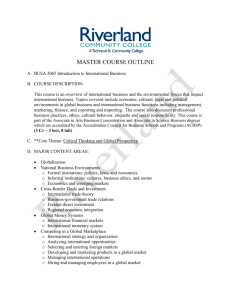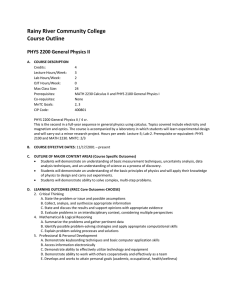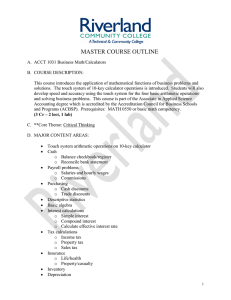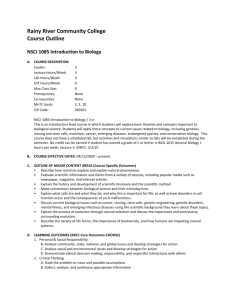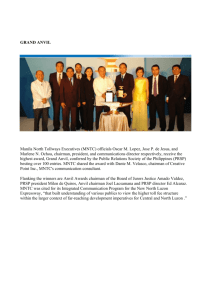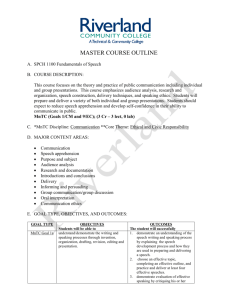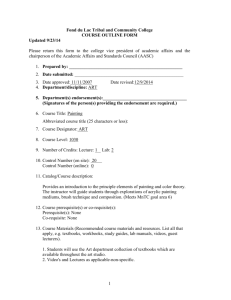course sheet - Riverland Community College
advertisement
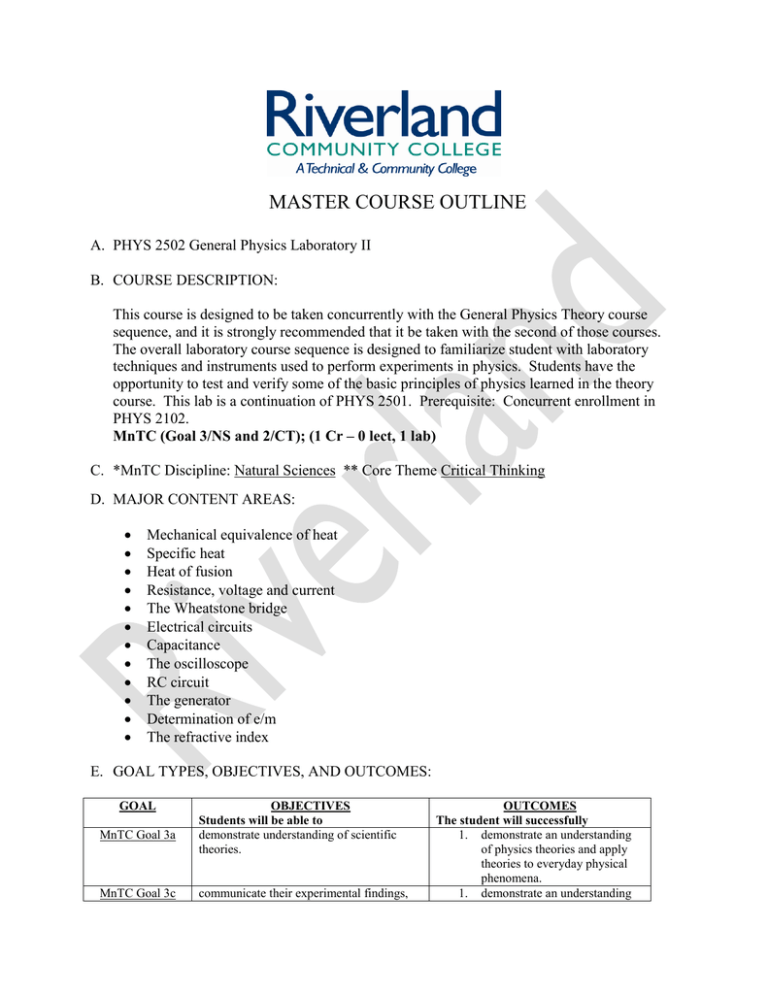
MASTER COURSE OUTLINE A. PHYS 2502 General Physics Laboratory II B. COURSE DESCRIPTION: This course is designed to be taken concurrently with the General Physics Theory course sequence, and it is strongly recommended that it be taken with the second of those courses. The overall laboratory course sequence is designed to familiarize student with laboratory techniques and instruments used to perform experiments in physics. Students have the opportunity to test and verify some of the basic principles of physics learned in the theory course. This lab is a continuation of PHYS 2501. Prerequisite: Concurrent enrollment in PHYS 2102. MnTC (Goal 3/NS and 2/CT); (1 Cr – 0 lect, 1 lab) C. *MnTC Discipline: Natural Sciences ** Core Theme Critical Thinking D. MAJOR CONTENT AREAS: Mechanical equivalence of heat Specific heat Heat of fusion Resistance, voltage and current The Wheatstone bridge Electrical circuits Capacitance The oscilloscope RC circuit The generator Determination of e/m The refractive index E. GOAL TYPES, OBJECTIVES, AND OUTCOMES: GOAL MnTC Goal 3a MnTC Goal 3c OBJECTIVES Students will be able to demonstrate understanding of scientific theories. communicate their experimental findings, OUTCOMES The student will successfully 1. demonstrate an understanding of physics theories and apply theories to everyday physical phenomena. 1. demonstrate an understanding analyses and interpretations both orally and in writing. MnTC Goal 3d MnTC Goal 2a MnTC Goal 2b MnTC Goal 2c evaluate societal issues from a natural science perspective, ask questions about the evidence presented and make informed judgments about science-related topics and policies. gather factual information and apply it to a given problem in a manner that is relevant, clear, comprehensive and conscious of possible bias in the information selected. imagine and seek out a variety of possible goals, assumptions, interpretations and perspectives, which can give alternate meanings or solutions to given situations or problems. analyze the logical connections among the facts, goals and implicit assumptions relevant to a problem or claim; generate and evaluate implications that follow from them. 1. of various physics theories related to the science of thermodynamics, electricity, magnetism, optics, and modern physics and apply them to reallife physics problems. identify science-related questions and make judgments on science-related policies adopted by the government. 1. demonstrate an ability to apply physics principles to explain everyday physical phenomena. 1. explore and explain „limits‟ to physics problems in this course. 1. demonstrate an ability to make the connections between facts, fact-based physics theories, and the implicit assumptions made in such theories. explain the implications that are the results of such theories. 2. F. SPECIAL INFORMATION: This course may require use of the Internet, the submission of electronically prepared documents and the use of a course management software program. Students who have a disability and need accommodations should contact the instructor or the Student Success Center at the beginning of the semester. This information will be made available in alternative format, such as Braille, large print, or current media, upon request. G. COURSE CODING INFORMATION: Course Code C/Class Maximum 48; Letter Grade Revision date: 10/12/10 AASC Approval date: 11/30/10 *Riverland Community College Disciplines MnTC Goal Number Communication (CM) Natural Sciences (NS) Mathematics/Logical Reasoning (MA) History and the Social & Behavioral Sciences (SS) Humanities and Fine Arts (HU) 1 3 4 5 **Riverland Community College Core Themes Critical Thinking (CT) Human Diversity (HD) Global Perspective (GP) Ethical and Civic Responsibility (EC) People and the Environment (PE) MnTC Goal Number 2 7 8 9 10 6 *These five MnTC Goals have been identified as Riverland Community College Disciplines. ** These five MnTC Goals have been identified as Riverland Community College Core Themes. NOTE: The Minnesota Transfer Curriculum “10 Goal Areas of Emphasis” are reflected in the five required discipline areas and five core themes noted in the Riverland Community College program of study guide and/or college catalog.
